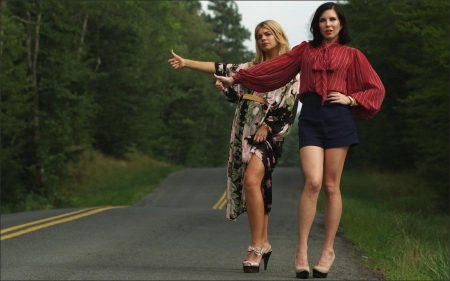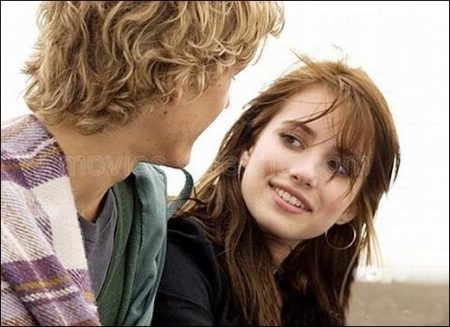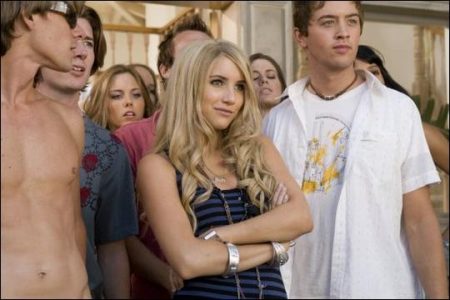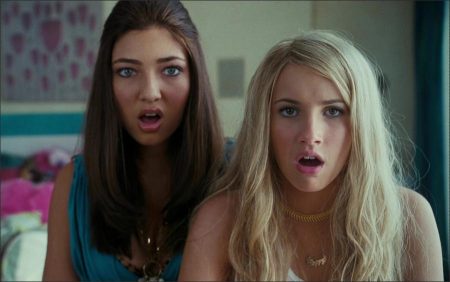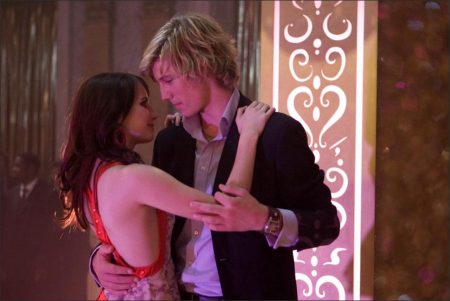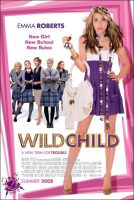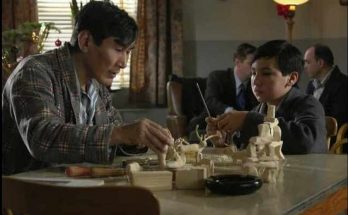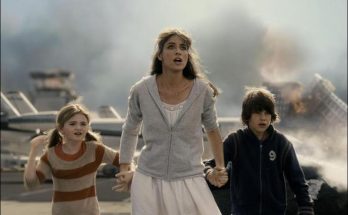Wild Child Movie Trailer. Screenwriter Lucy Dahl based her script for Wild Child on two quite different eras in her life. As a girl, she attended boarding school in England, and as an adult, she lived in Los Angeles and became the mother of teenage daughters. As she observed the behavior of her children and their school friends, she grew fascinated by their culture… and the similarities of young women across generations.
When imagining Wild Child, Dahl drew from a difficult time in her life about which she is not so proud. She relates, “I wrote the screenplay based on my antics when I was at school. I did actually set my school on fire, and I was expelled. I did have a real Mrs. Kingsley [the headmistress], and she was lovely.”
Her mentor’s feelings toward Dahl changed the day she learned what happened. Notes the screenwriter: “She was just so disappointed when she found out that I had done it. I called my Dad the day afterwards-because we didn’t get caught right away-and I said, `Someone set fire to the school last night!’ My Dad called Mrs. Kingsley and said, `There’s a maniac in your school! You’ve got to find her and get her out.’ He was a bit embarrassed when he found out it was me.”
Lucy was not the only Dahl in her family who was prone to acting up and upon whom the characters of Poppy and her clique were based. As she recalls, “I wrote it when I had teenage daughters in L.A. Girls at that age can be so horrible to each other. I’ve seen it and been the mean girl myself, and when you get older you just think, `Girls, girls, girls…don’t do it!’” Naturally, with all difficulty, there was humor to be found.
Working Title Films’ Tim Bevan and Eric Fellner responded to the coming-of-age tale and dark humor in Dahl’s script. Offers Bevan, “Wild Child is a fun and fresh departure for us, being the first film we have made specifically for teenage girls. We were drawn by Lucy’s sparky screenplay and the opportunity to show off the talents of a new emerging group of young actresses, led by Emma Roberts.”
Bevan and Fellner asked producer Diana Phillips to work alongside them for the film. As an American living in London and the mother of three daughters, Phillips had a solid understanding of the issues young girls faced as they grew up…and what it felt like to be a fish out of water.
Based on his longstanding relationship with Working Title, prolific editor Nick Moore was brought on to the project as a first-time director. This was the next logical step for the man who had edited a string of commercial and critical hits-including Notting Hill (starring another famous Roberts), About a Boy, Love Actually and Nanny McPhee-for the studio.
As Phillips suggests, Moore’s reputation as an established romantic comedy editor made him a natural fit to helm his own film. “Nick brings so much to the film from his perspective as an editor. His reputation as an amazing editor, much deserved, really does show up in his plans and preparations for the shooting.”
With its comedy, heart and universal themes of growing up and loss, Wild Child’s script struck a chord for Moore. He also saw in Dahl’s work an opportunity to create a film that would appeal to both American and British filmgoers, as well as audiences across the globe.
The filmmaker liked the throughline of teenagers coming to terms with the people they are becoming. He especially enjoyed Poppy’s arc of growing closer to her father again after her mother’s death devastated their family. “There’s a good moral story in there,” Moore provides. “Poppy wasn’t bad; she was a bit lost and needed to find herself.” He admits, however, “I also like to be cheered up by movies; it’s important to send people away feeling positive. If you’re crying a little and then a joke comes along, the joke’s all the better. Or if you’re laughing and then there’s an emotional bit, it feels sweeter.”
Casting the Film
When it came to selecting the lead role of Poppy, it was important to find a young American actress who could play a self-obsessed, pampered southern California socialite, as well as convincingly carry off a gradual transformation into a considerate, fresh-faced English schoolgirl. In popular teen actress Emma Roberts, Moore and the producers found the perfect blend. With a resume that includes Unfabulous, a successful Nickelodeon television show about the trials of a teenage girl, as well as the big-screen adaptation of Nancy Drew and the comedy Aquamarine, Emma Roberts was just the young woman for the part.
Phillips says, “This movie wasn’t going be made unless the perfect Poppy was found, and Emma stood out as a movie star. She was incredibly natural. She’s a real professional and has had her own TV show for a few years. It was the perfect movie for Emma at this stage in her career, and she’s proven to be incredible.”
For the performer, Poppy was the type of girl she’d often seen while working in Hollywood. Roberts was delighted at the chance to take the fake-tanned, bleach-blonde brat on the journey from the comforts of her swank Malibu home to the perceived confines of an English boarding school. The actress liked that Poppy, for the first time, would be forced to become accountable for her actions.
Roberts offers: “When she first gets to England from L.A., Poppy is a spoiled L.A. girl who just doesn’t want to be bothered with anything; then she starts a transformation when she gets there. She’s kind of mean but nice, deep down. I loved the character and the story. I have never played a character like Poppy before, so it was really cool to play someone different.”
Aidan Quinn was cast as Poppy’s long-beseiged father, Gerry. After reading Dahl’s screenplay, the father of two girls knew he wanted audiences to not only laugh through the film, but also find the humanity he saw in it. Quinn provides: “I hope the audience gets wrapped up in the emotions of the story and the feeling of what it is to be a teenager that’s troubled-then finds her way through it with friends, family and a degree of discipline and direction.”
Asked to portray the glamorous, yet formidable, headmistress Mrs. Kingsley was British performer Natasha Richardson. Too, Wild Child would not be the first time Richardson had worked with Quinn, her co-star in the critically-lauded adaptation of Margaret Atwood’s landmark “The Handmaid’s Tale.”
Richardson wasn’t only impressed with the screenplay, she was keen to work with a first-time director who was receptive to the feedback that she and her fellow performers offered. The actor enjoyed the fact that Moore married his skills as a seasoned editor with a receptiveness to input from cast and crew. Indeed, Richardson felt those attributes contributed to the relaxed atmosphere on set and allowed for better comedic performances.
The students at Abbey Mount School for Girls are supervised by the diminutive but strict Matron, played by Scottish actress Shirley Henderson. Poppy valiantly battles against Matron’s rules and finds herself head-to-head in a losing battle with the disciplinarian.
Henderson has spent much of the past decade as a boarding school student herself, though as a young girl who has been long-departed. As the ghostly Moaning Myrtle in the Harry Potter film series, the actor was well familiar with the trials of filming academy life. This production, however, reminded her of just what it felt like to be a student. She recounts of her time in school, “I used to get in to a lot of trouble because I was very small and very young for my age. I always used to stand up for myself and just quietly got through it.” Just like Poppy, Henderson admits, “I wasn’t a fan of school; it wasn’t my favorite place to be, but I just put my head down and got on with it.”
Along with the adults in Poppy’s world, it was as important to find the correct ensemble of young British actresses to play alongside Roberts. As her fellow classmates, they needed to be a group of girls that a young audience would identify with and believe would actually populate the academy.
Director Moore says, “Finding the girls was tough. These are parts for young girls, and so the actresses wouldn’t have necessarily had very much experience on screen. The important thing for us was to make sure that there was a group that you believed. We flew Emma over for a few days and had a whole bunch of girls try out. We tried different combinations until we felt we had the best ensemble.”
The casting process led to the mates with whom Poppy begrudgingly shares a dormitory room. Before becoming friends with them, the young American is the bane of existence to the mature Kate (Kimberly Nixon), easily flustered Drippy (Juno Temple), computer savy Kiki (Sophie Wu) and practical lacrosse player Josie (Linzey Crocker).
Poppy’s arch nemesis, the Head Girl named Harriet, is played by Georgia King. Ruby Thomas and Eleanor Turner-Moss portray her sidekicks, Jane and Charlotte. Finally, Rusty O’Hara was cast as Harriet’s much-abused school minion. When it came to selecting the actor to play Poppy’s love interest, Mrs. Kingsley’s son Freddie, the production turned to Alex Pettyfer, star of the spy thriller Alex Rider: Operation Stormbreaker. Pettyfer was chosen as the perfect young man to turn Poppy’s head. Unfortunately, he also happens to be the object of Harriet’s unrequited affections.
Other staff include Daisy Donovan as the nice-but-naïve sports teacher, Miss Rees-Withers; Nick Frost as Poppy’s genius hairstylist, Mr. Christopher; Jason Watkins as the incompetent French teacher, Mr. Nellist; and Selina Cadell as the dizzy drama instructor, Miss Loughton.
On the other side of the pond, Poppy’s American friends and family were rounded out by Lexi Ainsworth as her younger sister, Molly; Shelby Young as Poppy’s boyfriend stealing ex-best friend, Ruby; and Johnny Pacar as the former love of her life, Roddy.
Wild Child (2008)
Directed by: Nick Moore
Starring: Emma Roberts, Natasha Richardson, Shirley Henderson, Aidan Quinn, Kimberley Nixon, Juno Temple, Linzey Cocker, Eleanor Turner-Moss, Selina Cadell, Daisy Donovan
Screenplay by: Lucy Dahl, Kate Kondell, Daisy Donovan
Production Design by: Eve Stewart
Cinematography by: Chris Seager
Film Editing by: Simon Cozens
Costume Design by: Julia Caston
Set Decoration by: Robert Wischhusen-Hayes
Music by: Michael Price
MPAA Rating: PG-13 for some crude sexual content, language and drinking – all involving teens.
Distributed by: Universal Pictures
Release Date: August 15, 2008
Views: 287
